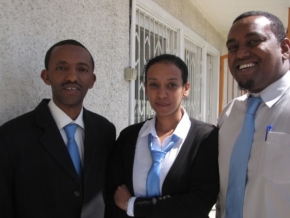Filling In the Gaps: Ethiopian entrepreneur launches phone-based medical consultation service
Dr. Yohans Emiru Wodaje recently launched an information communications technology company called Telemed Medical Services, which designs products that use existing infrastructure to deliver better health care in Ethiopia.
The first product, Hello Doctor, is a telephone consultation service, where people can receive a medical consultation over the phone from a doctor or nurse. They can pay for the service through their phone minutes and, if necessary, they can also access an ambulance or schedule a home visit with a provider.
Wodaje began crafting the idea for a health information and consultation service while working as a newly trained doctor at a government hospital in the remote Somali region of Ethiopia. After seeing the gap between service availability and demand in that region, he began collaborating with some friends to launch a website that would provide information on medical topics in different local languages. Recognizing that more people had access to mobile phones than the Internet, Wodaje decided to switch lines to a phone-based medical consultation service. He found a partner in BelCash, a Dutch technology solutions company which operates other mobile phone-based services in Ethiopia.
In August 2013, Telemed received funding from the HANSHEP Health Enterprise Fund to implement an innovative chronic disease tracking system for HIV and tuberculosis patients. (Full disclosure: Telemed has received grant funding through the USAID-funded Strengthening Health Outcomes through the Private Sector project, led by Abt Associates, which provides direct technical assistance. The author works for Abt Associates. She wrote about Echelon, which received a similar grant, last month.)
As a result of their involvement in the HANSHEP Health Enterprise Fund, Telemed actively sought out private venture capital and ultimately secured an investment from The Africa Group. A representative from The Africa Group has supported Telemed to improve commercialization of their products.
In mid-2014, the company plans to launch a mobile tracking system for patients receiving treatment for HIV and tuberculosis. The system will allow local health care providers in remote areas to register their TB and HIV patients on a database using very simple phones. The system will automatically generate phone calls to patients to give them information on their condition in local languages and to remind them to take their medication.
 (Drs. Adefirs, Rania and Wodaje, left to right, in Ethiopia. Photo by Montana Stevenson of Abt Associates)
(Drs. Adefirs, Rania and Wodaje, left to right, in Ethiopia. Photo by Montana Stevenson of Abt Associates)
The phone tracking system also asks the patient to complete a phone-based survey about whether or not they have taken their medication, if they are having any side effects from the medication, or if they are having any complications from their condition. The system is then programmed to send alerts to a patient’s health provider if they are experiencing certain symptoms, or they report that they did not take their medication. Eventually, Telemed plans to expand this system to other chronic diseases.
With support from the HANSHEP Health Enterprise Fund, Telemed expanded the number of doctors and nurses providing consultations and stepped up its marketing efforts to make more people aware of the service. While many calls come from mothers concerned about their newborns or toddlers, the service is also reaching people outside the domain of traditional providers. This includes patients who have conditions like mental health disorders, which, Wodaje explains, are heavily stigmatized in Ethiopia.
“There are very few centers that provide care for psychiatric (sic) conditions and (patients’ families) may not feel comfortable about taking (patients) to these already stigmatized institutions because people know what kind of service is being given there,” Wodaje said. “These people feel comfortable to call a doctor to where they are and we can go to them and give advice.”
Drs. Rania and Adefirs are two of the doctors who answer the phones at Telemed. Dr. Rania says she prefers the phone-based consultations because she gets to speak with patients who have a variety of ailments, which is different than being based in a hospital where patient care often is limited by doctors’ specialties. She also likes being able to reach people who might not otherwise seek care or feel as comfortable talking openly about their condition in a face-to-face setting.
Wodaje discussed some of the challenges of starting up, which ranged from identifying funders to handling business registration, to initially gaining support from the local government. But even with the challenges, for Wodaje, Telemed is a great fit: “I feel like I have found the right place for myself so this is what I am going to pursue.”
This blog originally appeared on the Strengthening Health Outcomes Through the Private Sector blog.
Montana Stevenson is an associate analyst in the International Health Division at Abt Associates.
- Categories
- Health Care
